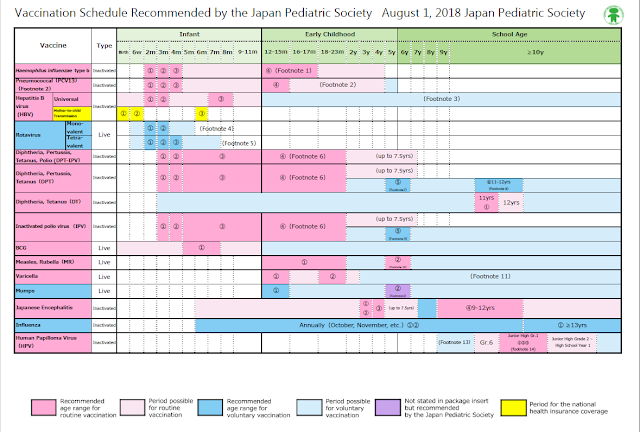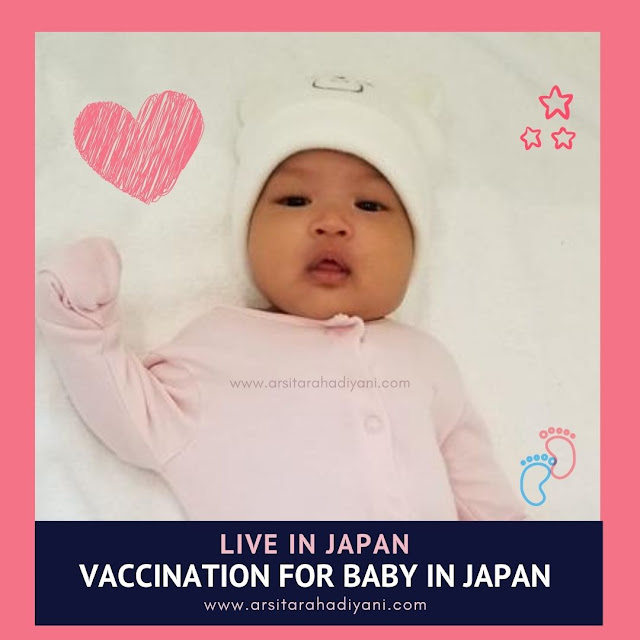In Japan, there are routine vaccinations which children must receive at particular ages designated under the Preventative Vaccination Act, and optional vaccinations which parents decide whether the child should receive the vaccination or not.
Live in Japan, Vaccination for Baby in Japan
The immunity to disease which mothers give their infants almost completely disappear 3 months after birth for pertussis and 12 months after birth for measles. Consequently, after these periods, infants must ward off disease by producing their own immunity. Vaccination supports this defense. Children go outside more often as they grow, as the consequence they are higher risk of infection.
Infection are caused by microorganisms, including viruses and bacteria, which invade the body and multiply. Symptoms may include fever, cough, or headache depending on the type of microorganism.
For that reasons, as a parent we need to learn about vaccination and have our child vaccinated for his/her health.
What is vaccination?
Vaccination is the administration of attenuated forms of viruses and bacteria or of their toxins which cause infectious diseases such as measles and pertussis. Giving these attenuated forms produces immunity against these diseases. A “vaccine” is a preparation used for vaccination.
Let’s Make a Vaccination Plan for Our Child
The routine vaccination is, in principle, given individually. Determine a specific schedule and order for vaccinations after considering municipal programs, the physical conditions of our child and the state of disease provenance, and by consulting with our doctor.
Vaccine and classified into two categories, live and inactive vaccines, and the appropriate intervals at which to give different vaccines must be maintained.
Live vaccines are made of attenuated live bacteria and viruses. Resistance (immunity) to the disease is established similarity to being infected by it. The measles-rubella (MR), measles, rubella, BCG, mumps, varicella (chicken pox), and rotavirus vaccines are belonging to this type.
Inactive vaccines are made by killing the virus or bacteria, extracting the components required to develop resistance (immunity) and eliminating their virulence. Inactive vaccines include the hepatitis B vaccine, diphtheria-pertussis-tetanus inactive polio vaccine (DPT-IPV), diphtheria-pertussis-tetanus (DPT) vaccine, diphtheria-tetanus (DT) vaccine, inactive polio vaccine (IPV), Japanese encephalitis vaccine, tetanus (T) vaccine, seasonal influenza vaccine, Haemophilus influenza type b (Hib) vaccine, pediatric pneumococcal conjugate vaccine and human papillomavirus (HPV) vaccine.
Interval vaccine that should be maintained
Interval of vaccination are counted from the next day after he vaccine.
An interval of at least 27 days should be taken from the day after receiving a live vaccine until the day of receiving a different vaccine.
And an interval of at least 6 days should be taken rom the day after receiving an inactived vaccine until the day of receiving a different vaccine.
Routine Vaccine for Baby in Japan
Routine vaccinations are all free of charge with coupons from city health centers in Japan. Shots are available at the time of group baby checkup or local pediatric clinics/hospitals. Our local health center post-mail free coupons to your house. We can make an appointment with designated local pediatrics for those vaccinations. We have to take the coupons and Mother and Child Health Handbook to our vaccination appointments. Routine vaccine for baby in Japan include:
- Hepatitis type B
- Hib
- Pneumococcal
- DPT-IPV (Diphtheria, Pertussis-Tetanus and Inactive Polio)
- BCG
- MR(Measles and Rubella)
- Japanese Encephalitis
- Varicella (Chickenpox)
Besides routine vaccine their also Optional Vaccine. This category is conducted for rotavirus, influenza, etc. In the case of rotavirus, vaccination should be scheduled as early as possible because the target age range is rather short.
Before having your child vaccinated
In my experience for having vaccinated my baby in Japan, there is some procedures need to be concern before taking the baby to the clinic for vaccination.
- Is our child in a good health?
- Does parent understand the necessary for the vaccination and the benefits and possible risks (adverse risk) of the vaccine that will be given to their child today? If the parent has any questions, they should write them down and give it to the doctor.
- Did the parent bring the Maternal and Child Health Handbook?
- Did the parent complete a vaccination screening questionnaire?
Vaccination should be performed when our child is in good health. Always take note of the physical condition and characteristics of our child. If we have any concern, it is better if we consult with our doctor, Healthcare Centre, or the municipal office in charge in advance.
We need to observe our child carefully from the morning on the day of vaccination and confirm that he or she is well.Even vaccination is schedule if our child appears sicks we should consult with our family doctor and decide whether our child support be vaccinated or not.
Thoroughly read the information about vaccinations provided by the municipal office so we can fully understand the necessity and the possible adverse effect of the vaccine. If we have any question as the doctor who is to vaccinate your child before vaccinations. And make sure to bring your Maternal and Child Health Handbook.
Screening questionnaire contains important information for the doctor in charge of vaccination That why we need to fill in the form completely and accurately.
The important things should notice by the parent is a child can only be vaccinated if a parent or Guardian fully understand the benefit of a possible adverse reaction to vaccinations and agree to have the child vaccinated.
The persons cannot receive vaccination
From Vaccination and Children`s Health Handbook that I had received from Tsukuba Municipal, these following persons cannot receive vaccination.
- A child with an obvious fever (37.5 degrees Celsius or higher)
- A child with a severe acute illness
- A child who has had anaphylaxis to any company of the vaccine preparation to given on that day. Anaphylaxis is an acute, severe systemic allergic reaction, usually within 30 minutes after vaccination including excessive sweating, a swollen face systemic severe urticaria, nausea, vomiting, hoarseness and respiratory distress, resulting in shock.
- Woman eligible for measles, rubella, varicella (chicken pox) and mumps vaccination and are known to be pregnant. This is a regulation not directly concerning children with important for a person who will receive voluntary vaccination.
- As concerns the BCG vaccination, a child with a keloids by vaccination, wound etc.
- Other conditions that a doctor considers inappropriate.
Precautions after Receiving Vaccination
There is some conditions that we should concern after vaccinating our baby- For 30 minutes after vaccination, observe observe your child at the Medical Institution or ensure that a doctor can be contacted immediately
- Watch for possible reaction for up to 4 weeks for Life vaccine or 1 weeks for inactive vaccine after vaccination.
- Bathing is allowed but avoid rubbing the vaccination site.
- Avoid strenuous physical activity on the day of vaccinations.
- If a child experience an abnormal reaction in the vaccination side or has a change in physical condition after vaccination consult a doctor immediately.
- For 30 minutes after vaccination, observe observe your child at the Medical Institution or ensure that a doctor can be contacted immediately
- Watch for possible reaction for up to 4 weeks for Life vaccine or 1 weeks for inactive vaccine after vaccination.
- Bathing is allowed but avoid rubbing the vaccination site.
- Avoid strenuous physical activity on the day of vaccinations.
- If a child experience an abnormal reaction in the vaccination side or has a change in physical condition after vaccination consult a doctor immediately.
Routine Vaccination
 |
| Vaccination Schedule fo Children in Japan. Source: https://www.jpeds.or.jp/ |
















